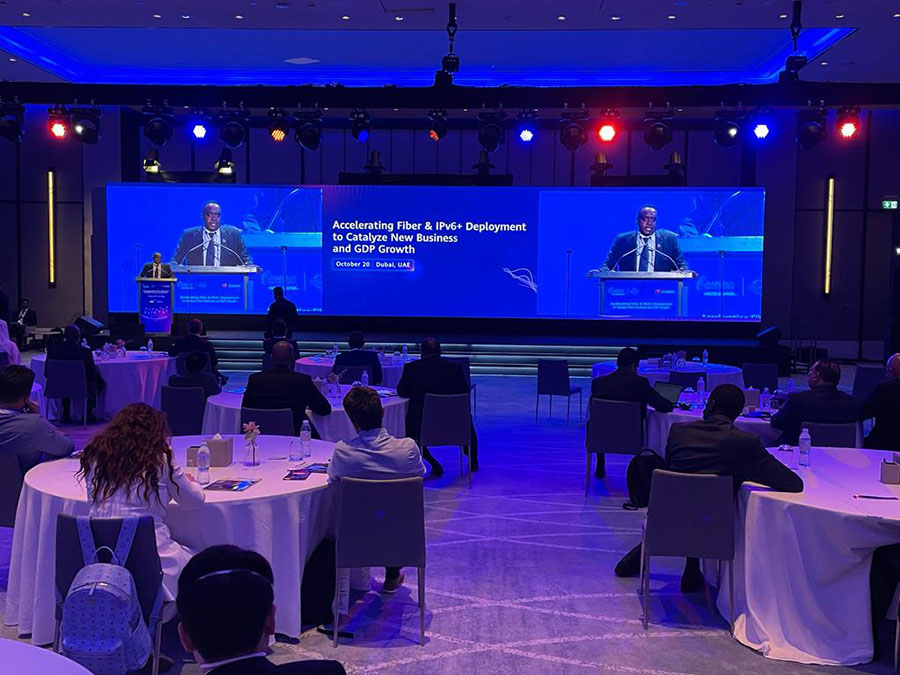SAMENA Council, during the Ultra Broadband Forum (UBBF)2021, held in Dubai, pressed upon the need to recognize the criticality of ultra-broadband networks and to enable their deployment for developing underserved communities and businesses in the SA-ME-NA region. Fixed-line fiber networks as well as intelligent cloud-based capabilities, leveraging the power of IPv6 and new cloud business models, lie at the foundation of a healthy and inclusive digital economy and the intelligent world in the making.
SAMENA Council’s message during the UBBF focused on advocating for advancing necessary fixed network infrastructure and leveraging the power of Fiber and IPv6, unlocking new capital, exploring new ways of sharing responsibilities to develop that infrastructure, developing human capital for the digital age, creating awareness and relevance to proliferate meaningful digital services, and ensuring everyone can afford broadband connectivity and quality-of-service. The Council also correlated the aims of the UBBF with the objectives of the Broadband Commission’s Agenda for Action, and also highlighted the recently released four strategic recommendations of the Broadband Commission’s Working Group on 21st Century Funding and Financing Models to address ICT infrastructure gaps, including gaps in fiber deployment.
The UBBF was followed by SAMENA Council’s SAMENA Accelerator – UBBF policy discussion forum, organized in collaboration with Huawei, to deep dive into issues ranging from processes, lack of enabling environment, lack of investment incentives, and other business and operational difficulties, which continue to impede deployment of fiber networks and migration from IPv4 to IPv6.
Adding to the multi-country perspectives by the ITU and from Europe, Africa, South Asia and the Middle East, achievements shared by TDRA (UAE), CITC (Saudi Arabia), PTA (Pakistan), NTRA (Egypt), and experience-sharing from Africa’s developing economies, including Senegal and Botswana, Bocar BA, CEO – SAMENA Council, in his message, encouraged the rectification of "Right-of-Way issues, Fiber deployment methodology selection, collaboration among Fiber players, and the need for governments to champion deployment of Fiber with full understanding of the Business, Social, Market, and National needs." The discussion on fiber deployment underpinned the importance of the Private Sector to work in close collaboration with the Public Sector, to drive common understanding on the flexibility, scalability, and asset potential of fiber networks
On the IPv6 front, the SAMENA Accelerator – UBBF discussion revealed how, increasingly, Administrations and the Private Sector in the SA-ME-NA region are recognizing the importance of IPv6, and are in the process of defining and implementing policies to support IPv6/IPv6+ development, aimed at promoting large-scale IPv6 deployment and IPv6+ technological innovation, and finally achieving IPv6 only networks.
The discussions connected economic development and digital inclusion with the promotion of IPv6 industry development and which, in the words of Bocar BA, requires "The will and determination to plan ahead and accelerate IPv6 transition. Not only will this open new door of opportunity across business, society, security, and overall sustainability of the ecosystem; it will literally help create the Intelligent Internet of everything, which is the ultimate goal of digitalization transformation." This message was complemented by Huawei’s Xipeng Xiao, Head of Standards & Industry Development for Data Communications at Huawei Europe, that "the first step in IPv6 transitioning is to start early, as it takes three years to acquire the necessary skills and capacity to fully implement IPv6."
As the issues of shrinking digital space, fostering a healthy IoT ecosystem, and making networks efficient and operations cost-effective are critical, the Private and the Public sectors need to consider some important factors that can contribute in the right direction when it comes to IPv6.
BA highlighted that the Private sector should aim for building consensus on approaches to implement IPV6 as smoothly as possible. Given that transition from IPV6 has its own cybersecurity and infrastructure asset security considerations, which demand timely placement in the agenda of the industry, while transitioning or thinking transition, it may be necessary to create learning modules that would allow for gaining understanding necessary for their role to manage the changes coming with the shift from IPV4 to IPV6. Moreover, the region’s economic development is greatly dependent on robust ICT/IT infrastructure. Thus, the private sector should work in synch with entities like the national IPV6 Task Force in Saudi Arabia and TDRA in the United Arab Emirates. Accelerated digital transformation requires an overall vision where technology, along with human capital, improves efficiency and effectiveness of business. This can only be achieved with a new internet protocol, and thus governments should play their role in necessarily driving adoption of IPv6, communicating IPv6 as a national priority, and encouraging cross-stakeholder and cross-industry participation in capacity




